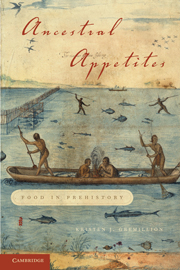7 - Contacts
Published online by Cambridge University Press: 05 June 2012
Summary
Foreigners cannot enjoy our food, I suppose, any more than we can enjoy theirs. It is not strange; for tastes are made, not born. I might glorify my bill of fare until I was tired; but after all, the Scotchman would shake his head and say, “Where's your haggis?” and the Fijian would sigh and say, “Where's your missionary?”
Mark Twain, Roughing ItThe display of fancy foods to enhance prestige often gets a boost from the importation of exotic goods which, because they are rare and often expensive, make ideal costly signals of wealth, power, and entrepreneurial skills. However, foods introduced through cultural contacts can have much more far-reaching consequences, becoming staples and sometimes completely replacing traditional sources of calories. When confronted with a novel food, people exhibit a wide range of responses at both the community and individual levels, from revulsion and rejection to enthusiastic incorporation into existing food traditions. Where on this scale any particular instance of food introduction falls depends on a number of factors. Historical happenstance often accounts for the availability of new foods – the where, when, and how of introduction. But to understand why some are adopted and others ignored, we need to consider both influences on human decision making and the forces of culture, which sometimes resists novelty but also plays the important role of incorporating new foods and techniques into the body of knowledge passed on to younger generations.
- Type
- Chapter
- Information
- Ancestral AppetitesFood in Prehistory, pp. 115 - 131Publisher: Cambridge University PressPrint publication year: 2011



